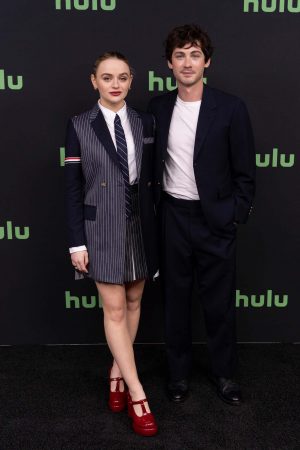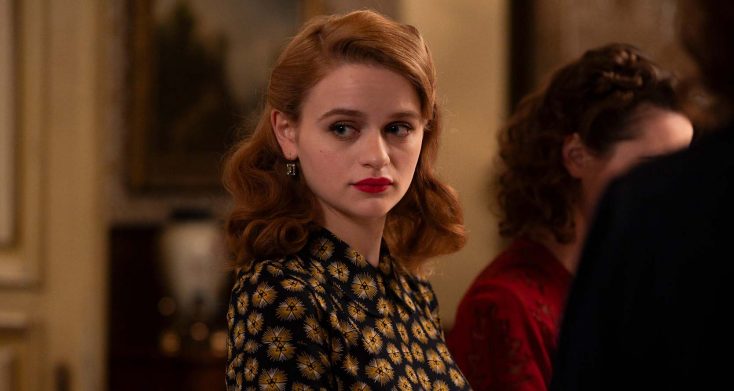
(l-r) Joey King and Logan Lerman attend the TCA Press Event for Hulu’s WE WERE THE LUCKY ONES at the Langham Huntington in Pasadena, California on February 9, 2024. ©Disney/PictureGroup.
By JUDY SLOANE
Front Row Features
PASADENA, CA -Hulu’s new limited drama, “We Were the Lucky Ones,” is based on the New York Times bestselling novel of the same name by Georgia Hunter, which was inspired by her relatives in Poland. It spotlights the incredible true story of a Polish Jewish family, including siblings Halina (Joey King, “The Act”) and Addy (Logan Lerman, “Percy Jackson & the Olympians: The Lightning Thief,) separated at the beginning of World War II who are determined to survive and reunite.
Erica Lipez, (“The Morning Show,”) wrote the screenplay and Thomas Kail (“Hamilton,” “Fosse/Verdon,”) directed the series which premieres on Hulu, Thursday, March 28, 2024.
Georgia Hunter, along with Joey King and Logan Lerman joined the TV Critics Association to discuss their gripping miniseries.
Q: Georgia, how did this project evolve for you? When you were growing up, were you hearing Addy’s story?
Georgia Hunter: I grew up very close with my grandfather, who Logan plays. He never talked about the fact that he grew up in Poland, or he was raised in the Jewish faith, or that he came from a family of Holocaust survivors. That was just not a part of our dialog and is a piece of his history that I discovered a year after he died, when I was 15, thanks to a high school English assignment and an interview with my grandmother Caroline. Some years later, I found myself at a family reunion [with my mother’s cousins] of the second generation telling stories about the war, and they were stories unlike anything I’d ever heard before. I remember sitting there, I was 21, and I was thinking someone needs to write these down. I didn’t know that someone would be me in that moment, but I think that’s when the idea was seeded and sat with me for another seven or eight years before I finally put a stake in the ground, and I set off to research and record this part of my story in 2008.
Q: The Addy that you knew, what was he like?
Georgia Hunter: He was so charismatic, so fun, always music playing in the house; very much a family guy, very forward-thinking and optimistic.
Q: Your book starts with Addy in 1939, but the series starts with Halina after the war. What was the process of deciding where to start this story for television audiences?
Georgia Hunter: That’s a great question. I think one of the hurdles that we might run into with audiences is to take that leap of faith to watch a show that’s set during the Holocaust. And I think one of the things, without giving too much away, in the beginning we wanted to paint a picture of what the show might entail right from the first few seconds. It’s a very key moment that we’ll come back to later in the show.
Q: Joey and Logan, how did being Jewish inform both your wanting to do this project?
Logan Lerman: It’s much more specific for me. My character, Addy, starts off in France and he manages to get out of Europe. And it’s about his journey trying to find safety, find refuge in another country, any country that will let him in. And he goes on a several-years-long journey trying to get to South America. My family had a similar story to that; ended up in China. So that element was really appealing to me because I haven’t seen that side of this history explored in any form of narrative storytelling.
Joey King: I feel similarly. It wasn’t just about the connection to my own Jewishness, but also being able to explore a role that touches on my own ancestry. It’s very personal. When it’s dealing with subject matter that is so personal to your own history and your own family and something you’re proud to be, it just makes it that much more special to step on the set every day with that in mind.
Q: There has been a rise in anti-Semitism. How important is it for you to bring this message to kids, your generation, to tell them about the Holocaust?
Joey King: I think that it’s super important to share with the generations; that is my generation and generations to come; the sadness that has been experienced throughout history in order to create empathetic people. With our show, educating people about one family’s story, acknowledging the pain and suffering of one community of people does not diminish the pain and suffering of another community of people. Having the ability to tell a story that educates people about the Holocaust from one perspective, I think it’s really important. It’s a beautiful show, too. It’s exciting to watch. You love these people. You want to know what’s going to happen with them. And it’s all true, which is incredible.
Logan Lerman: I think it’s important to tell these stories for every generation. This is about what happens when hate goes unchecked. And I think that you can apply that to current times and the future, and you can learn from the past and from this period of time. In terms of this story, what really attracted me to it and why I think it’s important, especially now, is that I haven’t seen this angle on it. It’s not just re-exploring something that’s been done before. This is new and interesting. And I think [it] will enlighten people about another aspect of World War II that maybe they weren’t familiar with.
Joey King: There were so many people affected by World War II, and there are so many interesting stories within all of those people. I feel every perspective from this particular time in history can be so unique, and I think they’re all worth telling. Our show especially is really hopefully optimistic. It deals with a lot of pain, suffering and sadness, but there is a lot of hope in this show. And we hope people feel that as well.





